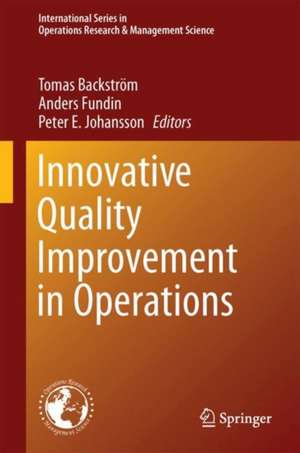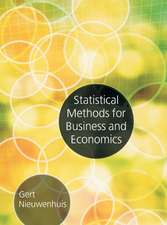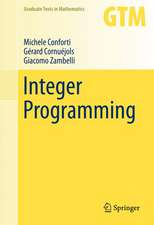Innovative Quality Improvements in Operations: Introducing Emergent Quality Management: International Series in Operations Research & Management Science, cartea 255
Editat de Tomas Backström, Anders Fundin, Peter E. Johanssonen Limba Engleză Hardback – 21 iul 2017
As a theoretical frame of reference, a perspective on change where conflicting demands and conflicting activities, e.g., exploration and exploitation, are seen as intertwined and interdependent, is used throughout the book. The ideal from this perspective is to make use of such conflicting forces and to develop the change dynamics by keeping them in the same social system, not to structurally separate them in different departments or different initiatives.
The main purpose of the book is to address an increased need for quality improvement through innovation and disruptive change in production. Traditional theories and managerial models of production systems are developed with a focus on stability and improvement. There is a need for enhanced models to reach an ability to develop new future production systems. The goal of the book is to provide nuances and new perspectives giving more realistic models of the production system to be able to increase the change potentiality of the organization and thus the long-term competiveness. Learning and organizational perspectives are in focus as enablers to increase the understanding of a production system as such. Long-term competitiveness through adaptability and the potential for radical improvement is of importance throughout the book. The use of dualities and the concept of ambidextrous organizations as a frame of understanding is the innovative strength for this area.
| Toate formatele și edițiile | Preț | Express |
|---|---|---|
| Paperback (1) | 776.09 lei 6-8 săpt. | |
| Springer International Publishing – 22 aug 2018 | 776.09 lei 6-8 săpt. | |
| Hardback (1) | 781.94 lei 6-8 săpt. | |
| Springer International Publishing – 21 iul 2017 | 781.94 lei 6-8 săpt. |
Din seria International Series in Operations Research & Management Science
- 20%
 Preț: 331.25 lei
Preț: 331.25 lei - 9%
 Preț: 696.06 lei
Preț: 696.06 lei - 20%
 Preț: 570.62 lei
Preț: 570.62 lei - 18%
 Preț: 1132.02 lei
Preț: 1132.02 lei - 18%
 Preț: 773.72 lei
Preț: 773.72 lei -
 Preț: 170.40 lei
Preț: 170.40 lei - 17%
 Preț: 459.35 lei
Preț: 459.35 lei - 17%
 Preț: 360.48 lei
Preț: 360.48 lei -
 Preț: 263.40 lei
Preț: 263.40 lei - 24%
 Preț: 905.31 lei
Preț: 905.31 lei - 17%
 Preț: 460.09 lei
Preț: 460.09 lei - 17%
 Preț: 459.35 lei
Preț: 459.35 lei - 20%
 Preț: 631.58 lei
Preț: 631.58 lei - 13%
 Preț: 480.01 lei
Preț: 480.01 lei - 18%
 Preț: 738.28 lei
Preț: 738.28 lei - 18%
 Preț: 1225.94 lei
Preț: 1225.94 lei - 18%
 Preț: 948.92 lei
Preț: 948.92 lei - 18%
 Preț: 703.88 lei
Preț: 703.88 lei - 18%
 Preț: 957.44 lei
Preț: 957.44 lei - 15%
 Preț: 651.84 lei
Preț: 651.84 lei - 20%
 Preț: 336.21 lei
Preț: 336.21 lei - 15%
 Preț: 641.03 lei
Preț: 641.03 lei -
 Preț: 404.29 lei
Preț: 404.29 lei - 18%
 Preț: 950.21 lei
Preț: 950.21 lei - 15%
 Preț: 649.06 lei
Preț: 649.06 lei - 18%
 Preț: 725.75 lei
Preț: 725.75 lei -
 Preț: 394.12 lei
Preț: 394.12 lei - 18%
 Preț: 951.47 lei
Preț: 951.47 lei - 15%
 Preț: 639.59 lei
Preț: 639.59 lei - 18%
 Preț: 773.06 lei
Preț: 773.06 lei - 18%
 Preț: 889.29 lei
Preț: 889.29 lei - 15%
 Preț: 655.60 lei
Preț: 655.60 lei - 15%
 Preț: 640.06 lei
Preț: 640.06 lei
Preț: 781.94 lei
Preț vechi: 953.58 lei
-18% Nou
Puncte Express: 1173
Preț estimativ în valută:
149.64€ • 162.49$ • 125.70£
149.64€ • 162.49$ • 125.70£
Carte tipărită la comandă
Livrare economică 22 aprilie-06 mai
Preluare comenzi: 021 569.72.76
Specificații
ISBN-13: 9783319559841
ISBN-10: 3319559842
Pagini: 179
Ilustrații: IX, 177 p. 36 illus., 20 illus. in color.
Dimensiuni: 155 x 235 mm
Greutate: 0.44 kg
Ediția:1st ed. 2017
Editura: Springer International Publishing
Colecția Springer
Seria International Series in Operations Research & Management Science
Locul publicării:Cham, Switzerland
ISBN-10: 3319559842
Pagini: 179
Ilustrații: IX, 177 p. 36 illus., 20 illus. in color.
Dimensiuni: 155 x 235 mm
Greutate: 0.44 kg
Ediția:1st ed. 2017
Editura: Springer International Publishing
Colecția Springer
Seria International Series in Operations Research & Management Science
Locul publicării:Cham, Switzerland
Cuprins
Contents.- Introduction by editors.- Quality management for both stability and development (Anders Fundin and Bo Bergman).- Explore and exploit in lean production (Peter E Johansson).- Kaikaku and kaizen in lean production (Yuji Yamamoto).- A knowledge perspective on explore and exploit (Mattias Elg).- An organizational perspective on explore and exploit (John Bessent).- Leadership for exploration and exploitation (Tomas Backström and Jim Hazy).- Idea-generation and idea-implementation as a group task (Bengt Köping Olsson).- Creating spaces for exploration and exploitation (Jennie Schaeffer).- Conclusion and future research directions by editors.
Notă biografică
Tomas Backström is a Professor of Innovation Science at Mälardalen University, Sweden. Starting with an undergraduate degree in Engineering Physics and a PhD in Engineering, his work has grown more and more multi-disciplinary and he has published articles and chapters in a wide spectrum of venues such as: The Learning Organization, International Journal of Computer Integrated Manufacturing, Economics and Business Letters, Nonlinear Dynamics, Psychology, and Life Sciences, and Emergence: Complexity & Organization. With experience from thirty-five years of research in work life he currently researches and teaches about innovation management and creativity in groups and organizations, with a special focus on communication and leadership.
Anders Fundin is a Professor of Quality Technology and Management at Mälardalen University, Sweden. With a PhD in Quality Technology and Management and a MSc in Engineering his interest has evolved in areas suchas Quality Technology and Management, Operations Management and Change Management. Through 18 years of research and development experience within the automotive industry his research work has been published in journals such as for example, International Journal of Operations and Production Management, International Journal of Service Industry Management, International Journal of Quality and Reliability Management, and Journal of Business and Industrial Marketing.
Peter E. Johansson is a Senior Lecturer in Innovation Science since 2012, and since 2015 he is the subject representative for Innovation Science at the School of Innovation, Design and Engineering. Peter is a part of the research group Workplace Innovation and Quality Management, WIQM, and he received his PhD in Education in 2011 at Stockholm University; specialized in the fields of workplace learning, learning organisations and organization pedagogics. Peter has been involved in several cross-disciplinary research projects, and his current research interests are positioned in the intersection between operations management and innovation management research. His research deals with the origins of, and conditions for, learning and development of innovation competencies; on an individual and organisational level as well as the relation between those.
Anders Fundin is a Professor of Quality Technology and Management at Mälardalen University, Sweden. With a PhD in Quality Technology and Management and a MSc in Engineering his interest has evolved in areas suchas Quality Technology and Management, Operations Management and Change Management. Through 18 years of research and development experience within the automotive industry his research work has been published in journals such as for example, International Journal of Operations and Production Management, International Journal of Service Industry Management, International Journal of Quality and Reliability Management, and Journal of Business and Industrial Marketing.
Peter E. Johansson is a Senior Lecturer in Innovation Science since 2012, and since 2015 he is the subject representative for Innovation Science at the School of Innovation, Design and Engineering. Peter is a part of the research group Workplace Innovation and Quality Management, WIQM, and he received his PhD in Education in 2011 at Stockholm University; specialized in the fields of workplace learning, learning organisations and organization pedagogics. Peter has been involved in several cross-disciplinary research projects, and his current research interests are positioned in the intersection between operations management and innovation management research. His research deals with the origins of, and conditions for, learning and development of innovation competencies; on an individual and organisational level as well as the relation between those.
Textul de pe ultima copertă
This book examines current and emerging challenges in manufacturing related to the ideal of developing production processes with variability and agility on one level of the system, combined with structures ensuring stability and robustness on another level; close to what by other scholars has been discussed in terms of continuous innovation. However, this ideal has proven to be difficult to achieve in practice, and there is a need for enhanced and more sophisticated theoretical models dealing with the complexity surrounding organizational conditions to foster incremental as well as radical change in production systems, and, at the same time to ensure stability over time.
As a theoretical frame of reference, a perspective on change where conflicting demands and conflicting activities, e.g., exploration and exploitation, are seen as intertwined and interdependent, is used throughout the book. The ideal from this perspective is to make use of such conflictingforces and to develop the change dynamics by keeping them in the same social system, not to structurally separate them in different departments or different initiatives.
The main purpose of the book is to address an increased need for quality improvement through innovation and disruptive change in production. Traditional theories and managerial models of production systems are developed with a focus on stability and improvement. There is a need for enhanced models to reach an ability to develop new future production systems. The goal of the book is to provide nuances and new perspectives giving more realistic models of the production system to be able to increase the change potentiality of the organization and thus the long-term competiveness. Learning and organizational perspectives are in focus as enablers to increase the understanding of a production system as such. Long-term competitiveness through adaptability and the potential for radical improvement is of importance throughout the book. The use of dualities and the concept of ambidextrous organizations as a frame of understanding is the innovative strength for this area.
The main purpose of the book is to address an increased need for quality improvement through innovation and disruptive change in production. Traditional theories and managerial models of production systems are developed with a focus on stability and improvement. There is a need for enhanced models to reach an ability to develop new future production systems. The goal of the book is to provide nuances and new perspectives giving more realistic models of the production system to be able to increase the change potentiality of the organization and thus the long-term competiveness. Learning and organizational perspectives are in focus as enablers to increase the understanding of a production system as such. Long-term competitiveness through adaptability and the potential for radical improvement is of importance throughout the book. The use of dualities and the concept of ambidextrous organizations as a frame of understanding is the innovative strength for this area.
Caracteristici
First book to look at the integration of innovation, quality management, and operations management Editors and contributors are very prominent in their fields Focuses on the simultaneous phenomena of “explore and exploit”











